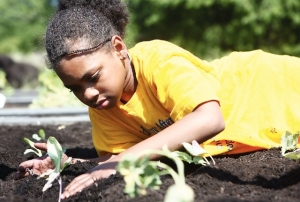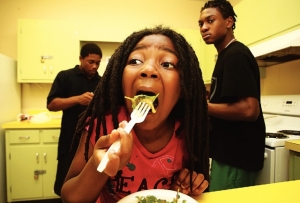Community gardens give Goldsboro chance to eat, live healthier
By Kenneth Fine
Published in News on May 9, 2010 1:50 AM

News-Argus/MICHAEL BETTS
Kadijah Pearsall plants cabbage and collard greens at Dillard Academy Friday.

News-Argus/MICHAEL BETTS
Anansi Stephens enjoys a summer salad made from some of the vegetables planted at the W.A. Foster Center, Wednesday.
Her eyes and mouth wide open, Anansi Stephens zeroes in on a forkload of greens, radishes, cheese and dressing.
The 9-year-old doesn't seem to mind that the majority of her after-school snack was surrounded by bugs and dirt moments earlier -- and having pulled the produce, herself, from the garden located just outside, she would know.
"Now that's good right there," the little girl said, licking her lips before going back for another bite.
The half-dozen other children in that kitchen must have agreed.
"Would you look at that," said Cheryl Alston, director of the Wayne Food Initiative. "They ate all that salad right up."
"They look forward to it," replied Gladys McClary, who, among other things, runs the cooking class at the city-facilitated W.A. Foster Center. "It's their work."
And that fact, the idea that urban youths have helped construct, maintain and harvest a garden that sits on what used to be a rundown basketball court, tells Ms. Alston the concept of urban farming she has been promoting for years has real potential in Goldsboro.
"Seeing them enjoy the food they grew, it just melts my heart so good," she said.
But the success of the garden program spearheaded at W.A. Foster by the center's director, Russell Stephens, is just one example of the "movement" she has seen gain momentum across the city in recent years.
Local schools, churches -- even the library -- now have gardens of their own -- and young bodies and minds soaking in the physical and educational benefits many agree come with the experience of working in them.
*
His arms caked in dirt to the elbows, 10-year-old Xavier Tart and his friend, Montavious Barnes, show off their tomato plants and collard greens.
This particular plot, one of dozens located behind Dillard Academy, is the boys' fourth-grade class's responsibility.
And so are the rows of the cabbage they, just moments before, helped their peers plant.
"It's real nice over here," Xavier said, looking over the crops he and his classmates will soon harvest. "I really like it."
But his opinion of the garden is not unique among the students at Dillard.
The children, their teachers say, covet the responsibility that comes with nearly daily trips to the site.
And they seem eager to accomplish their schoolwork successfully and in a timely fashion -- knowing that the reward is more learning, perhaps over a strawberry or two, in their favorite "classroom."
"When we have them scheduled to come out to the garden, when it's time for them to do their work, they do it quicker," said Helen Wilson, Xavier and Montavious' teacher. "And then when they come out here, it helps them back in the classroom. I really think the fresh air and the feeling of actually being a part of something helps them do better."
The garden also provides unique opportunities for teachers, she added -- "real-life" examples of everything from entomology to chemistry.
"And the garden is teaching them how to grow their own food, for one thing," she said. "And responsibility -- teamwork."
And for other students, it provides a sanctuary of sorts.
"We use the garden for everything," said Danielle Baptiste, Dillard's after-school director. "Like sometimes, you have a child with a behavior problem ... and our behavior specialist will bring them out to the garden just because it's a quiet place where the child can do something with their hands to calm back down. It really does work."
Ms. Alston is a regular at the Dillard garden, too.
And in the five years since the first seeds were planted there, she, too, has seen its value to the community stretch far beyond its role as a sustainable healthy food source.
"We first started out with the academic component because we found that it reached the children outside the box ... and by doing so, they were able to focus on their end-of-grade tests. They just did great. ... Most of them just did really well," Ms. Alston said. "What has happened, the teachers have been able to incorporate the writing and the reading, so that they write stories about their little bugs and about their gardens, and they are writing songs, all tied in to what it means to grow this food and eat healthy.
"There is real learning going on out here."
*
The reach of the Wayne Food Initiative is expanding, thanks, in part, to the successes at places like Dillard and W.A. Foster.
And the organization, one that was once characterized as a "loose coalition" is growing in influence and numbers.
Travis Uzzell is among those affiliated with the group, and for the past two years, he and his children, Jarred and Zaria, have been doing some urban farming of their own.
After Hurricane Floyd, the area formerly known as Washington Park was "flooded out," leaving few possible uses for the city-owned land.
So Uzzell asked the City Council if he could turn it into a farm -- a test site that would prove urban farming could work right here in Goldsboro.
And today, several crops now grow there on elevated beds built on a weathered slab of concrete.
"What we're doing here is actually trying to teach the people that you can farm inside the city," Uzzell said. "If you don't have nothing but concrete, you can still grow."
But the farm expands far beyond that slab.
Dozens of long rows stretch across the site, producing everything from beans and peas to broccoli and watermelons.
"We've got some of everything but we're trying to show people, really, that in a small amount of space, you can feed your family," Uzzell said. "One of the most basic, expensive things is the food you eat, so if you've got that covered, as long as you've got a roof over your head, you're going to make it."
But like Ms. Alston, he, too, promotes the educational benefits that come with working the land.
"People don't really realize what we lost when we lost all these farms. We lost good, healthy food, but we also lost education for our kids," he said. "Kids who grow up on a farm, they use their hands, they use their minds. When we lost that, our kids lost a lot."
So Uzzell opens up his farm to friends and neighbors -- anyone, really -- who want to learn how to create a food source for their families regardless of where they live or how much room they have to grow.
"Come on out," he said. "We're basically out here every day."
*
Back at W.A. Foster, Mayor Al King said he sees real potential in the "food revolution" he says is taking form throughout Goldsboro -- just as he sees an opportunity to battle childhood diabetes and obesity in the inner-city.
"That's one of the primary purposes and advantages of this thing. It teaches young kids to eat healthy. Right now, these kids don't want to go to McDonald's. And God knows, our kids are getting to be obese ... so we need places like this to bring them healthy food to eat," King said. "And the lady who saw the potential is Ms. Alston. Years ago, she came to me at City Hall to talk about community gardens and urban farming, and I have just seen it take off since then. And I think you are going to see it spread as the kids get into it."
Children like 7-year-old Damien Dancy and 13-year-old Atreya Wright, who were at the center garden the following day to pull some weeds -- and have a taste of some fresh spinach.
"I like just to see the stuff grow," Atreya said, after doing some planting with Damien and Anansi.
"And eating it," Damien replied, after munching on a few greens.
Stephens, who supervises dozens of children at the center as part of its after-school program, smiled.
To him, the garden is about more than learning and eating.
"What we're seeing, it's not just the kids. It's the adults, too," he said. "When you get the kids out here like this working -- and sometimes, this neighborhood gets a bad rap -- but when you see the adults and kids working around here, it just gives you a sense of hope that the community will grow right along with these plants out here."
His wife, Shorlette, sees that same kind of community effort at the garden she took charge of across town at the Wayne County Public Library.
"That's what a movement is all about. You've got to get people from all walks of life involved," she said. "I think that a lot of times, when movements are created, a lot of times the folks who need it the most, they are not included in the foundation of that movement.
"So we thought also about ways people can be empowered by making healthy choices in their lives."
And in the three years since, "it really has been the community" that has kept the garden thriving.
"You shouldn't be limited because you don't have the financial means to purchase this food. Should your health have to suffer because you can't afford this stuff?" Mrs. Stephens said. "So this is a true community garden, where people can come by and pick a few weeds and then take a few herbs, vegetables, whatever they need."
And her hope, one she shares with Uzzell, King, Ms. Alston and others, is that, maybe, these simple gardens will lead to a major shift in the way people think about food.
"How can I be mad at someone for making a decision that has to do with their basic survival? I can't be mad at four for $1," Mrs. Stephens said. "So if you give people seeds and the space and the knowledge to grow on their own, you might just be changing what that person's idea of survival is. Survival doesn't have to be day-to-day."
